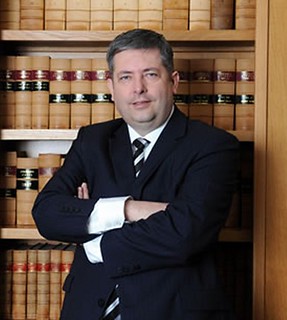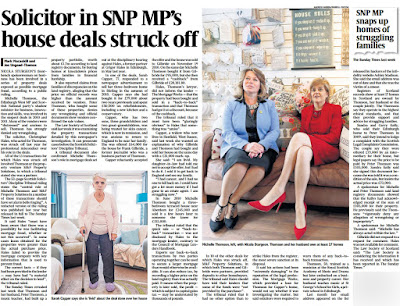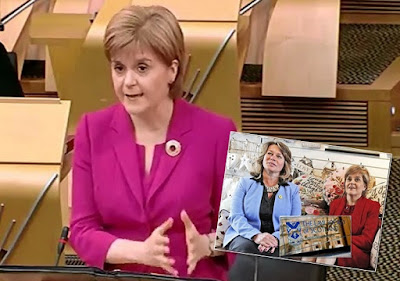 Custody deaths review role for ex Lord Advocate linked to lawyer advising Police in Sheku Bayoh custody death. A FORMER Lord Advocate with links to a suspended judge who is now representing Scottish Police Officers in a controversial custody death case - has been appointed by the Home Secretary to chair a UK wide review into deaths & accidents in Police custody.
Custody deaths review role for ex Lord Advocate linked to lawyer advising Police in Sheku Bayoh custody death. A FORMER Lord Advocate with links to a suspended judge who is now representing Scottish Police Officers in a controversial custody death case - has been appointed by the Home Secretary to chair a UK wide review into deaths & accidents in Police custody.
However, it can be revealed Dame Elish Angiolini DBE QC (55) (nee McPhilomy) used the services of the very same suspended Sheriff - Peter Watson - who is now representing and advising Police Officers involved in the death in Police custidy of Sheku Bayoh.
According to documents in the possession of Audit Scotland – who are investigating claims about public cash spent by the Crown Office – Elish Angiolini billed taxpayers for upwards of £56,000 for personal legal services provided by Peter Watson and his former law firm – Glasgow based Levy & McRae.
The final amount of public cash paid to Watson & Levy & McRae for their services to Angiolini may be higher - as the Crown Office are resisting calls to disclose documents and final figures.
Levy & McRae – where Watson was based until late last year - are also known to have represented Police Officers who were charged and prosecuted for a number of serious criminal offences including rape, assault & fraud.
Watson (61) served as a Sheriff until he was suspended earlier this year by Scotland’s top judge, Lord Brian Gill.
The suspension came after Sheriff Watson was named in a multi million pound writ seeking £90m in damages for the collapse of hedge fund Heather Capital.
Levy & McRae are also named in the writ, which alleges the firm was involved in multiple fraudulent cash transfers to offshore jurisdictions.
In August of this year, the Court of Session heard how Watson received a £200K payment from an Gibraltar based law firm – Hassans.
Suspended from his judicial duties, Watson is now giving legal advice to and issuing media comment on behalf of Police Officers involved in the controversial death in custody of Sheku Bayoh.
Last week, a Press Release was issued by Media House International on behalf of suspended Sheriff Peter Watson - in his role of representing Police Officers involved in the Sheku Bayoh case.
Watson, along with former Justice Secretary Kenny MacAskill – attacked public interest media coverage of the death of Sheku Bayoh while in Police custody.
The 31-year-old trainee gas engineer, who left Africa and settled in Kirkcaldy, died in May of suspected asphyxia while in police custody after he was restrained by up to nine officers .
A post-mortem examination revealed he had cuts and bruises all over his body, including more than 20 facial injuries and tiny blood spots in his eyes.
Sheku’s death is being investigated by PIRC - Scotland's Police Investigations and Review Commissioner - but former justice secretary Kenny MacAskill appeared to prejudice the investigation in comments he made last week. MacAskill said he did not expect police officers to face charges .
And, right after MacAskill made his remarks - as if following a script - current Lord Advocate Frank Mulholland intervened, appealing for calm following a row between Kenny MacAskill and Aamer Anwar, the lawyer representing Mr Bayoh's family.
Yesterday, Justice Secretary Michael Matheson said on BBC Politics Scotland it is not helpful if people give a "running commentary" on the death in police custody of Sheku Bayoh.
Police Officers in Scotland contacted the High Commission (Embassy)of Sierra Leone to discuss repatriating his body but officials at in London were alarmed and contacted the father-of-two’s family – who were unaware of Police Scotland’s attempt to remove the body from the UK.
Press Release from suspended sheriff Peter Watson claimed “open season of hunting Police Scotland”:
Last week, a Press Release was issued by Media House International on behalf of suspended Sheriff Peter Watson - in his role of representing Police Officers involved in the Sheku Bayoh case.
Watson, along with former Justice Secretary Kenny MacAskill – attacked public interest media coverage of the death of Sheku Bayoh while in Police custody.
The Press Release, featured in some Scottish newspapers earlier this week read: SHEKU BAYOH – THE 10 VITAL QUESTIONS (Issued on behalf of Prof. Peter Watson BA LLB SSC of PBW Law)
Glasgow, October 19, 2015: Kenny MacAskill, the former Justice Secretary, has made a timely and important intervention in openly criticising the media campaign waged against Police Scotland, the PIRC and the officers involved in the Sheku Bayoh case.
He points to an “open season of hunting Police Scotland” rather than allowing due process to follow and for the investigation to be completed. He highlights the importance of protecting the integrity of whatever judicial process will follow, most likely a Fatal Accident Inquiry. He also points to a litany of assumptions of racism and homicide, and the misrepresentation of statistics of deaths in custody in England. The statistics surrounding deaths in custody in England have little to do with what happens in Scotland, where most deaths in custody relate to drink or drugs.
Mr MacAskill rightly points to the poisonous atmosphere which has been created and recognises that those who are the subjects of these wild accusations and criticisms cannot comment as they are involved in this process, and can do no more than co-operate in that process.
Prof. Peter Watson said: “As the lawyer representing the Police Officers involved, I welcome these comments from the former Justice Secretary and I agree the sooner we get to whatever Judicial Proceedings are to follow the better. This will most likely be a Fatal Accident Inquiry. This will establish the facts and do so on evidence tested in Court. In broad terms, the Inquiry will set out to explain what happened on May 3 which led to Sheku Bayoh, known locally as Chris and by some as “socks” to be on the streets of Kirkcaldy in the early morning, being confronted by the Police and sadly dying.
“I will not engage in speculation as to the outcome nor make wild allegations. The information which has come into the public domain suggests there was a fight in a house, and that Sheku Bayoh had taken drugs. This information will shape some of the questions which must be answered. The family say there is no justice without truth. There are, I suggest, ten questions that will lead us to the truth:
Along with 10 questions, alleging a number of ‘what ifs’, Prof. Watson added: “These questions will be asked. Answers to these questions will help get to the truth, as will the post mortem and toxicology reports. The family have their own reports. Although information has been drip fed to the media with details of bodily injury, the family have so far refused to release their reports, whilst at the same time demanding that the PIRC or the Crown release evidence, which as the investigating agencies, they clearly cannot do. There is no reason why the family cannot release the reports they hold if they want the public to have a full and balanced understanding of their position.
“I doubt whether these questions will be answered until evidence is given in Court by all those involved but my hope is that until then, the PIRC and the Crown are allowed to complete their investigation in an atmosphere free of orchestrated media events and unsubstantiated allegations.”
The press release issued on behalf of Peter Watson came after a number of media reports revealed a number of allegations including racism & violence against Police Officers involved in the Bayoh case.
Concerns have also been expressed by many including the family of Mr Bayoh on the progress of an ‘independent’ investigation by PIRC - Scotland's Police Investigations and Review Commissioner into the circumstances surrounding the death of Mr Bayoh while he was in Police custody.
Ex Lord Advocate linked to lawyer defending custody death cops - to chair deaths in Police custody inquiry:
The Home Office website reveals the terms of reference for the Home Office inquiry chaired by Elish Angiolini on deaths in Police custody:
-
to examine the procedures and processes surrounding deaths and serious incidents in police custody, including the lead up to such incidents, the immediate aftermath, through to the conclusion of official investigations. It should consider the extent to which ethnicity is a factor in such incidents. The review should include a particular focus on family involvement and their support experience at all stages.
-
to examine and identify the reasons and obstacles as to why the current investigation system has fallen short of many families’ needs and expectations, with particular reference to the importance of accountability of those involved and sustained learning following such incidents.
-
to identify areas for improvement and develop recommendations seeking to ensure appropriate, humane institutional treatment when such incidents, particularly deaths in or following detention in police custody, occur. Recommendations should consider the safety and welfare of all those in the police custody environment, including detainees and police officers and staff. The aim should be to enhance the safety of the police custody setting for all.
It has also been confirmed that there will be a formal role for INQUEST, a charity that offers advice to families bereaved by death in police custody. Deborah Coles, Director at INQUEST, has been appointed as a special adviser to the chair and the charity will:
-
facilitate family listening days so that the Chair can hear evidence first-hand from those who have lost loved ones in police custody to ensure their views are taken into account.
-
play a leading role on an advisory board which will offer expert advice to the Chair during the course of the review.
Home Secretary Theresa May said: I am pleased that Dame Elish Angiolini has agreed to chair the independent review into deaths and serious incidents in police custody. When I announced this review, I said that the Chairman would be someone with the ability to work closely with victims, families and the police alike, and with a proven track record of being willing to ask difficult questions. Dame Elish has all of these qualities.
Thankfully, deaths and serious incidents in custody are rare. And no one – least of all police officers – wants such incidents to happen, and I know everyone involved takes steps to avoid them. But when such incidents do occur, they are a tragedy that has the potential to undermine the relationship between the public and the police. As Home Secretary, I have been struck by the pain and suffering of families still looking for answers.That is why I set up this independent review and I’m grateful to Dame Elish and Deborah Coles, as special advisor to the chair, for agreeing to take on this important work.
Failing to mention any previous link to suspended Sheriff Watson, Dame Elish Angiolini DBE QC said: “This is a matter of critical importance to many families and I hope that this review can identify pragmatic and effective responses to this longstanding issue.”
The Home Office has not commented on the links between Angiolini & the suspended Sheriff Peter Watson.









